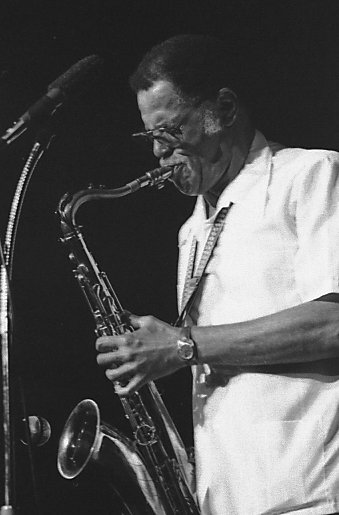Dexter Gordon was a pioneering jazz saxophonist who made a career of expertly blending rhythm and romance on the bandstand and the silver screen. Nicknamed “Long Tall Dex” for his 6-foot 5-inch frame, the Los Angeles, California native was born on Feb. 27, 1923. Gordon’s father, Frank Gordon, M.D., was one of the first prominent African American physicians in Los Angeles and counted Duke Ellington and Lionel Hampton among his patients.
Young Gordon took up the clarinet at the age of 13 before switching to saxophone (initially alto, then tenor) at 15. His big break came in 1940 at the age of 17 when he joined Lionel Hampton’s band. From 1943 to 1944 he was featured in the bands of Louis Armstrong, Billy Eckstine, and Fletcher Henderson. Gordon made his first recordings under his own name in 1945 when he signed with the Savoy label.
By 1945, Gordon had moved to New York City, New York where he began performing and recording with Charlie Parker. Gordon also was famous for his saxophone duels with fellow tenor sax player Wardell Gray. They recorded several albums between 1947 and 1952. In 1955 Gordon wrote the musical score for the Broadway play The Connection.
Like so many of his fellow jazz musicians, Gordon by the mid-1950s was addicted to heroin and spent much of the decade in jail. In 1960 he had kicked his addiction and re-emerged as a significant jazz musician. He started recording again, this time on the Blue Note label with The Resurgence of Dexter Gordon (1960).
In 1962 Gordon went into a 14-year self-imposed exile in Europe. Living mostly in Copenhagen, Denmark, by then married and with a son, he taught jazz while continuing to play and record. Gordon found Europe in the 1960s a much easier place to live, saying that he experienced less racism and greater respect for jazz musicians there than in the United States. In 1972 Gordon recorded one of his most important and commercially successful albums, Tangerine, with Thad Jones, Freddie Hubbard, and Hank Jones.
Gordon returned to the United States in 1976 and appeared at the Village Vanguard in New York City. This homecoming performance was recorded and released under that title. Two years later he was voted musician of the year by Down Beat magazine. In 1980 he was inducted into Down Beat’s Jazz Hall of Fame.
In 1986, Gordon turned actor in the motion picture ‘Round Midnight, portraying the character of Dale Turner, based on the experiences of two other famous jazz musicians, Bud Powell and Lester Young. Gordon’s portrayal earned him an Academy Award nomination in 1987 for Best Actor.
Dexter Gordon died of kidney failure on April 25, 1990, at age 67 in Philadelphia, Pennsylvania.

